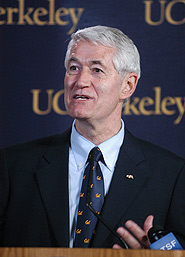Berkeleyan
New leadership role for campus in global research
Elite institutions from four continents gathered in Singapore recently to launch the 10-member International Alliance of Research Universities. Berkeley's chancellor and dean of International and Area Studies participated
![]()
| 02 February 2006
Berkeley has become a charter member of the newly launched International Alliance of Research Universities (IARU), a consortium of 10 research-intensive institutions on four continents whose membership ranges from Yale, Oxford, and Cambridge universities to ETH Zurich, Australian National University (ANU), Peking University, and the University of Tokyo.
Chancellor Robert Birgeneau signed the formal memo of understanding at the group's inaugural meeting Jan. 13 and 14 in Singapore, which he attended with John Lie, the campus's dean of International and Area Studies. The National University of Singapore (NUS) and the University of Copenhagen are the other initial participants in the group, which will not admit any new members until Jan. 1, 2009.
 Robert Birgeneau (Peg Skorpinski) |
"Of course there are already a large number of associations of universities," acknowledges Birgeneau, "so I think a natural question people might ask is, Why this one? And the answer to that is, virtually all of the other organizations have very large numbers of institutions as members, which makes concerted action on any individual issue very difficult. And often these organizations involve a range of institutions, some of which are commensurate with Berkeley, but most of which are not."
Initiated by NUS and ANU, the alliance vows in its founding document to "bring a new dimension to international cooperation by universities, wherein members engage one another in multiple ways in research and educational endeavors." Although some research proposals could be taken up by the entire membership, others would likely involve collaboration among two or three institutions with special interest or expertise in a particular area.
Birgeneau and Lie say the network will provide leading research universities with a global platform for advocacy on such issues as threats to academic freedom and ethical questions related to stem-cell research and nanotechnology. They also expect it to lead to new opportunities for collaboration by Berkeley researchers with colleagues from around the world, new possibilities for undergraduate-student exchanges, and new leadership roles for Berkeley across a spectrum of transnational challenges from global poverty to the environment.
As one "fantasy" - which he's quick to explain "just means we haven't worked out the details" - Birgeneau conjures the prospect of a genuinely international education for Berkeley undergrads.
| 'I think having presidents from all of these universities, which are very important in their individual countries, speaking out coherently on particular subjects could be quite powerful.' -Chancellor Birgeneau |
Lie, the campus's "point person" for contacts with the fledgling organization, agrees, citing IARU's promise for creating "worldwide environmental leaders."
"Undergrads could go around the world," he says, "and gain a sense of the truly global impact of environmental problems, understand some of the diverse responses, and at the same time create new networks of global leaders who are interested in solving some of the pressing environmental problems."
Lie adds that IARU would not only create "an infrastructure to facilitate collaboration" but, by bringing together scholars from beyond U.S. borders, could open up funding streams previously unavailable to American researchers, and to Berkeley faculty members in particular.
Moreover, he says, the alliance "can catapult campus initiatives to international attention," citing Birgeneau's Berkeley Diversity Research Initiative (BDRI) as one obvious candidate. The initiative, he explains, "may appear to many here as a purely domestic enterprise. However, it turns out that for virtually all the countries represented in the alliance, multiculturalism and multi-ethnic relations are of prime importance. The BDRI can promote other campuses' research and teaching, which in turn can promote our own research and teaching in this area."
A laboratory for the world
Birgeneau, while noting that the diversity initiative is "California-focused," adds, "My view is that California's a laboratory for the world. And for many of these other countries - Switzerland's one, Australia's another - this is an area of interest, and one where we can play a leadership role."
Another such area, he believes, is gender issues, "and especially women's issues in the academy." Birgeneau earned a reputation for effective advocacy on gender issues while at the Massachusetts Institute of Technology, and he cites the influence of Berkeley leaders like Mary Ann Mason, dean of the graduate division, and Angelica Stacy, associate vice provost for faculty equity. He anticipates that during the next year Berkeley will begin to develop a partnership on research into gender issues in the academy with Alison Richard, Cambridge University's vice chancellor, who attended last month's meeting in Singapore.
| 'The IARU provides a forum for leaders of these top research
universities to gather together and discuss some of the pressing issues that impinge on higher education today.
' -IAS Dean John Lie |
Meanwhile, Lie will serve as Berkeley's liaison to the group, with responsibility for informing faculty here of new opportunities for research collaborations.
"Globalization is an ineluctable fact of the 21st century," observes Lie, "and IARU provides a useful venue to explore international research, teaching, exchange, and so on for UC Berkeley, not just for faculty members but for our students as well."

